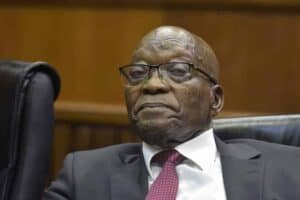‘Things are happening; it’s not enough, but watch this space’ says renowned prosecutor.

The private sector often complains about the burden of legislative and regulatory compliance, and the bad news is that it’s not going to get any easier.
“There is a spate of new laws that require companies to demonstrate they have policies and procedures in place to prevent corruption,” says Steven Powell, a specialist white-collar crime prosecutor and head of ENSafrica’s forensic practice.
Powell and renowned prosecutor Billy Downer, known for prosecuting high-profile individuals, including former president Jacob Zuma, participated in a panel discussion about halting corruption in South Africa at an investment conference in Cape Town on Tuesday.
The discussion was moderated by Pauli van Wyk, investigative journalist at Daily Maverick.
ALSO READ: Here’s why Downer will not be removed from Zuma’s arms deal corruption case [VIDEO]
‘Do your homework on your business partners’
According to Powell, the new Section 34A in the Prevention and Combatting of Corrupt Activities Act (Precca) has significantly increased companies’ risk of getting caught up in corrupt activities.
For example, if a company’s business partner commits bribery to benefit the company, the company is guilty of an offence – even if it did not know about the corrupt activities.
“The new section requires companies to demonstrate they have adequate policies and procedures to prevent corruption. It will also necessitate risk assessments to understand what the vulnerabilities to corruption are.
“So, for those of you who represent organisations here today – if you haven’t recently done a risk assessment, you should do that soon because you’ll need to produce evidence of these adequate procedures and due diligence,” Powell warned.
The risk assessment involves “doing homework” on business partners, making sure they’re not “rogue”, training staff, and having processes in place to monitor vulnerabilities to risk, he added.
ALSO READ: SA stays on greylist due to its remaining strategic deficiencies
Getting un-greylisted
The new legislation is the government’s way of demonstrating to the Financial Action Task Force – the intergovernmental organisation focused on combating money laundering and terrorism financing – that South Africa has done enough to get off the grey list, according to Powell.
“We hope early in 2025 that we will convince the FATF that we have the new laws in place and that we can demonstrate we enforce them.”
South Africa was greylisted in February 2023 for not complying with international standards of the prevention of money laundering, terrorist financing, and proliferation financing.
Fifteen of the 20 legislative shortcomings the FATF identified seem to have been addressed. The remaining actions will need to be resolved in time for South Africa’s reassessment in February 2025.
ALSO READ: Failure to prevent corruption now a criminal offence
More private-sector cooperation
Downer, who has been a prosecutor for the National Prosecuting Authority (NPA), says there is a danger that the new Section 34A might not lead to prosecutions.
“The existing Section 34 did not produce prosecution or conviction. We as prosecutors are dependent on the police for their investigations as well as its commercial crime units.”
Downer is however optimistic about the formation of the Investigating Directorate Against Corruption (IDAC) within the NPA, which now has full police powers and the ability to do criminal investigations independently.
Downer believes the experts within the IDAC have a new desire to cooperate with the private sector.
“The NPA is not allowed to get funding from the private sector, but there are structures in place to receive forensic and investigative services from the private sector and it has delivered results.”
According to Downer, a case in point is when the NPA enlisted the services of Wim Trengove SC, among others, in the Steinhoff matter.
“[The] Steinhoff [matter] was languishing in the state capture years, not getting anywhere.
“But the minute the private sector was brought in to help – when Trengove tweaked the charge sheet – it resulted in the chief perpetrator feeling he couldn’t take it anymore.”
Downer was referring to Markus Jooste, former CEO of Steinhoff, who took his own life in March this year when he was expected to hand himself over to the police.
“When there’s good cooperation between the private sector and the public sector things happen as they should,” he said, referring to the more vigorous approach that became possible in this case.
ALSO READ: Four state capture accused MK party members sworn in as MPs
‘What’s the plan, Billy?’
Van Wyk commented that some state capture-linked individuals have found their way back to parliament as members of Zuma’s MK Party.
“They even serve on the portfolio committee of justice …
“If the authorities are stalling, it seems the crooks propel themselves into higher places. What’s the plan, Billy?” she asked.
South Africans will see more successful prosecutions from the NPA going forward, Downer said.
“When the Scorpions [a former specialised unit in the NPA] was abolished, South Africa went from an ideal state with a much-desired investigative unit to one where the NPA was captured.
“The one main thing is the top structures [of the NPA] are now uncaptured. The prosecutors are incorruptible people.
“Ten years of state capture cannot be reversed in five years. The NPA hears the cries of the public. We want the crooks in the ‘tjoekie’. But we have to follow the law and find the evidence.”
Downer says leaks from the public do not turn into evidence automatically. “We need to get proof [of] where the information comes from, who said what to whom; put it into a package.
“Just give us more time. Things are happening. It’s not enough but watch this space.”
This article was republished from Moneyweb. Read the original here.
Support Local Journalism
Add The Citizen as a Preferred Source on Google and follow us on Google News to see more of our trusted reporting in Google News and Top Stories.






